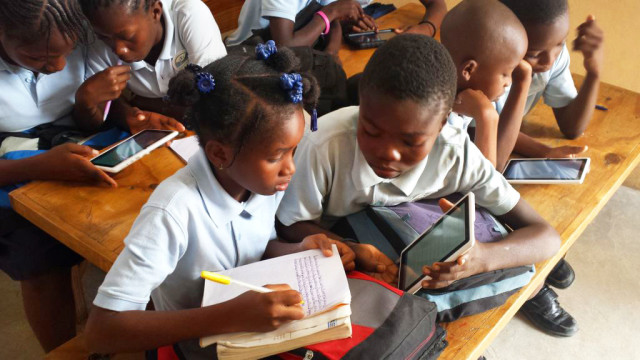
Two students at a school in Gressier, Haiti, who have a five-month Library for All access, use the library in class for a lesson. (Maritza Chateau and Amanda Truxillo)
A 2013 project to create a digital Library for All platform in Haiti has now put books at the fingertips of up to 2,000 school-aged kids, many of whom are former child slaves living on less than two dollars per day.
The Respire Haiti school in Gressier served as the pilot for the program. One of the school’s French teachers felt a digital library would be useful “to help us develop our faculty, our students, their intellectual capacity and our teaching.”
And students seemed to love the idea. Twelve-year-old Sephora, who enjoys reading stories, said the library allows her to look up words she is not familiar with in the dictionary. Crystal, who is 15, said her school needs a library and expressed her happiness for having this resource.
Founded by Rebecca McDonald and Tanyella Evans, the non-profit Library for All group targets school children, teachers, and adults taking literacy classes. Project leaders hope to reach one million users by the end of the year and have set their sights on a much higher number.
“We are on a mission to provide the 250 million children who are not currently learning the basics of reading and writing with access to the tools they need to learn, dream and lift themselves out of poverty,” said Isabel Sheinman, Director of Business Development at Library For All, in an email interview.
She acknowledged that this is an ambitious goal.
“The greatest value of our Library is that it has been built to scale,” she said, meaning that the group will be able to increase the number of users “dramatically” in the coming months.
The pilot project started in October 2013, targeting one school in Haiti. Sheinman said 70 percent of the students were former restaveks or child slaves, and both teachers and students had limited educational resources, particularly in Haitian Creole.
“What we found was that local content by Haitian Creole publishers was by far the most popular,” said Sheinman. “Some of the students had never seen a book in Haitian Creole and were delighted to see children who looked like them in the illustrations.”
As a result of the pilot, Library for All partnered with local publishers to help fill the gap and initiated training programs for teachers and technical support staff.
The program is not free. Local partners in Haiti pay an annual implementation fee per student. Library for All helps schools find affordable, low-end devices to access the digital books.
“Each country will be different,” added Sheinman. “But in Haiti our current partners have elected to pay this fee for the first year and will consider passing this off to the local community in future years. This is our model of sustainability.”
Ten Haitian schools have already joined the program and Sheinman expects more than 30,000 students at 60 schools to join within the next few months.
The library is currently available for Android devices and provides access to more than 1,200 books in six languages. Other versions are in the works.
“We are currently raising the funds needed to build different versions of the Library app, which will make it accessible on a wider range of devices,” said Sheinman. “We are also working on a public domain release — a version of the app available to everyone in Haiti, the Congo and Rwanda, whether they are in school or not.”
Sheinman said the public domain app will include titles that she believes will be relevant for parents in rural communities and children learning literacy.
In addition to that, she said the group has launched a pilot in the Democratic Republic of Congo “to provide 2,000 students access to international French and local content via low-cost tablets” and is currently “mapping out a pilot in Rwanda for 2015.”
With millions of children in need of books, Sheinman said Library for All hopes to expand to reach five million users by the end of 2017.

One response to “Digital Library Connects Haiti’s Poorest Kids to World of Books”
[…] المصدر […]